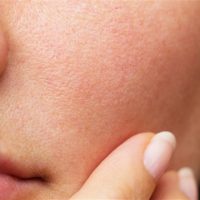What is your skin type, how to know it, & ways to care for it
Know what’s better than choosing well? Choosing RIGHT.
How many of us have bought the “best” products yet didn’t get any results, or worse, negative ones?
In order to grant your skin the care it needs you must use what’s suitable for it, and first things first, you start by knowing its type.
There are generally 4 skin types: Dry, Normal, Oily & Combination
Dry Skin
Dry Skin is a type of skin that produces less sebum (natural oils produced by the skin) than the normal amount, which is why it doesn’t retain the moisture it needs for protection against external influences and loses its elasticity.
Causes of dry skin
- Inefficient water supply: The skin loses its water either due to external influences (heat, stress, activity) or naturally (the skin disseminates about ½ liter of water from deeper skin layers per day)
- Inappropriate skincare: using products that aren’t suitable for dry skin or using strong soaps, frequent washing, or long, hot baths or showers which strip away natural skin moisture.
- Environmental conditions: harsh weather, seasons changing & ultraviolet light
- Genetics
- Age: as people get older, their skin’s ability to produce moisture decreases.
- Smoking.
- Dehydration: not drinking enough amount of water.
- Diet: lack of nutrients, unsaturated fatty acids, and vitamins especially Vitamin C and E.
How to identify dry skin?
Dry skin tends to feel rough, tight, brittle, and with low elasticity & sometimes itchiness.
Dry Skin Care
- Use a cleanser that is effective yet gentle not to strip away the skin’s natural moisture.
- Make sure to moisturize frequently
- Drink huge amounts of water and fluids to hydrate your skin
- Reduce time spent in showers & make sure the water temperature is not too hot.
Oily Skin
Oily skin is a type of skin that produces an increased amount of sebum (natural oils produced by the skin), making it more prone to breakouts and acne.
Causes of Oily Skin
- Genetics.
- Increased stress & anxiety.
- Hot & Humid Climates.
- Changes and imbalances of hormones.
- Aggressive washing/exfoliation: stripping away oils causes the skin to react by producing even more oil to make up for the loss.
- Usage of make-up products that irritate the skin
- Not wearing sunscreen: this can dry out your skin, leading to more sebum production.
- Not using moisturizer instead of finding a suitable type.
How to identify oily skin?
Oily skin is notable for visible pores, shine, paleness and it is often prone to blackheads, whiteheads and all forms of acne.
Oily Skin Care
- Regular washing with gentle cleansers.
- Using a Toner: this helps minimize skin pores.
- While towel drying, pat dry instead of rubbing.
- Use light, water-based, oil-free moisturizers to control excess sebum production.
Normal Skin
“Normal skin” is used to describe healthy skin with a balanced production amount of sebum, making it neither dry nor oily.
How to identify normal skin?
Normal skin is characterized by fine pores, soft and smooth texture, lack of blemishes, and uniform color, as well as it not being prone to sensitivity.
Combination Skin
How to identify combination skin?
combination skin is characterized by having large pores, dry zones, and oily zones.
The T zone (forehead, nose, chin & area circling the mouth) produces an increased amount of sebum while other areas experience dryness
Causes of Combination Skin
- Stress
- Genetics
- Your skin not getting enough nourishment
- Not using protection against harmful sun rays (SPF)
Combination skincare
- Use products for combination skin
- Exfoliate regularly to avoid clogged pores
- Make sure all the products you use are fragrance-free
- Exercise more often
Note that your skin may be any of these types and sensitive as well, which means it gets irritated easily and by factors that are tolerated by well-balanced skin sensitivity is visible in the form of:
- Redness
- Itchiness
- Stinging
- Burning feeling
So never forget to patch test before usage and choose products for sensitive skin.
& remember, treat your skin as an investment, it’s going to represent you for the rest of your life.
| ReplyForward |

